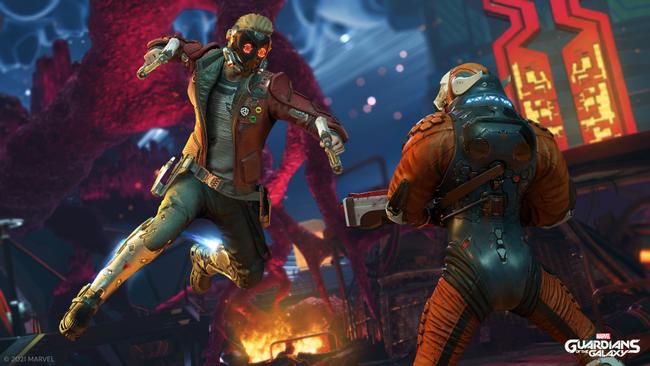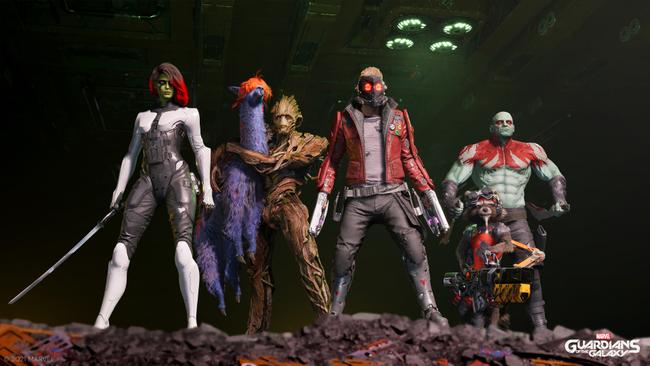
Just how deep are the RPG elements in the Guardians of the Galaxy game? Here’s what the developers say
You know what we’re like. We’re RPG Site. That means when we watch gaming events we’re not just looking at the games we know are of the role-playing genre - we’re desperately scouring every single game there, looking for signs that it might have some RPG-ish mechanics to sink our teeth into. Such was the case with this year’s E3 Square Enix Presents stream - which featured the reveal of Marvel’s Guardians of the Galaxy, the newest game from Eidos Montreal.
Guardians piqued our interest for a few reasons. For one, it’s developed by the same studio that delivered the rebooted Deus Ex games - both strong first-person stealth action titles with a strong streak of role-playing elements. Second, it’s Square Enix’s second crack at a licensed Marvel title. The first, Avengers, was replete with RPG-style mechanics akin to those in Destiny, even though the publisher seemed especially keen to not describe it as a role-playing game.
When the Guardians gameplay deep-dive featured glimpses of things like dialogue choices and XP counters, the game fully caught our interest. In a lot of the conversation online, its apparent mix of action combat and team dynamic dialogue wrangling prompted comparisons to Mass Effect from the press and fans.
But how much role-playing goodness is in the game really? We had a chance to catch up with Jean-François Dugas, Guardians of the Galaxy’s Senior Creative Director, and quizzed him on the RPG aspects of the game.

“While there are some RPG elements, it is still an action-adventure first and foremost,” explains Dugas, immediately tempering our expectations a little. The key was to deliver an exciting action-adventure game first and foremost - which meant ensuring any RPG-style trimmings on the game weren’t so deep as to distract or clutter that experience.
You can see this streamlining in things like the number of abilities characters have available to them, for instance, but also in aspects such as the game’s choice-driven narrative, which offers players agency to shape the story but still absolutely is heading in one defined direction. With that said, there’s still customization to wrangle as you head up the Guardians team.
“All the Guardians, including Peter, have different abilities to unlock,” says Dugas. As you play, XP points and then ability points are earned - and these are used to unlock the abilities of Star-Lord, the de facto head of the team and the playable protagonist. The other Guardians unlock their abilities through what Dugas calls “narrative circumstances” - but the point is that choice is handed over to the player as to what abilities to unlock and when, thus slightly adjusting your team composition and fighting style.
There is one other gameplay-related quirk that harks back to Eidos Montreal’s role-playing design in Deus Ex - upgrades. Rather than upgrading body parts with sci-fi augmentations, though, Star-Lord can get perks through this system.
“As you journey through the various locations, you can find component parts hidden in the world. When you have enough parts, Rocket can use a workbench located on the Milano, or somewhere in the many visited locations, to unlock perks for Peter,” says Dugas. “As an example, it ranges from improvements to the health-regen system, to the ability to hover for a longer period of time when you use your jet-boots in combat.”
As mentioned, one element of the game that is undoubtedly role-playing is in the character choice - though as we’ve been told, it’s still an action-adventure first, and all of the story design has been filtered through that lens. The branching story is best described as a reverse hourglass - which is to say that it’s narrow at the start, wide in the middle, but narrows again towards the end of the game.

Basically, everyone will start and end this version of the Guardians of the Galaxy’s story in the same place - but your journey will vary. That journey is also new & different to what Marvel fans might be familiar with; this is a unique version of the Guardians that lifts plot points and character notes from all of the comic book and film versions of the characters while also adding all-new elements. Even seasoned Guardians fans will have much new to experience, such as a new backstory of how Peter Quill left earth and the origin of his Star-Lord moniker.
“Its linearity will allow all players to go on the same epic adventure. However, choices made during the journey will make players experience certain parts differently,” says Dugas of the story’s structure.
“You can expect light consequences that mostly bring a different flavour to a scene, while bigger consequences may bring you to a different scenario.”
Dugas gives vague, spoiler-free examples from the previously-released gameplay demo - suggesting that choosing to sell Groot to Lady Hellbender will have more significant repercussions than choosing to throw Rocket over the chasm, for instance.
“We also track all the choices you make until the end of the game. It is fair then to think about possible payoffs even after the credits rolled!”
So - there you have it. It’s looking to be an action-adventure game with the lightest RPG touches. Which is, to be fair, pretty much what we expected - those social media comparisons to Mass Effect always seemed a bridge too far. There’s definitely enough here to scratch one’s RPG itch at least a little, however - and we look forward to seeing more of Eidos Montreal’s take on the Guardians in October. Just… here’s hoping this team can eventually return to Deus Ex, too.